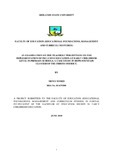Please use this identifier to cite or link to this item:
https://cris.library.msu.ac.zw//handle/11408/3321Full metadata record
| DC Field | Value | Language |
|---|---|---|
| dc.contributor.author | Moyo, Nosizi | - |
| dc.date.accessioned | 2018-11-08T14:07:30Z | - |
| dc.date.available | 2018-11-08T14:07:30Z | - |
| dc.date.issued | 2018 | - |
| dc.identifier.uri | http://hdl.handle.net/11408/3321 | - |
| dc.description.abstract | This study sought to examine the teachers’ perceptions of the implementation of inclusive education at Early Childhood level in primary schools in the Hope Fountain cluster in the Imbizo District. The research design followed both quantitative and qualitative approaches since data gathered was both descriptive and numerical. The research was conducted in Hope Fountain Cluster, Imbizo District in Bulawayo Metropolitan Province which consists of eight schools. A population of sixty four participants which comprised of eight school heads, eight teachers in charge and forty four early childhood education (ECD) teachers. The study also used a non-probability sampling called convenience sampling were a total of twenty respondents were selected to represent the population. These consisted of four school heads, four TICs and twelve ECD teachers. Questionnaires were administered to ECD teachers and interviews conducted to administrators to gather a much info as possible and also to check if their responses correlate to each other. Data was presented in three different ways namely, tables, bar graphs and pie charts. The research found that the ministry of primary and secondary education (MoPSE), still lags behind on policy implementation with regards to inclusive education. The ministry has not yet done enough to ensure pre-service teachers are equipped with necessary attitudes, virtues and skills to handle children with disabilities in an inclusive environment. Teacher’s perceptions on inclusive education are guided by ignorance on how to deal with leaners with disabilities and as such the negatively impact on the implementation strategies on inclusive education. School authorities are not doing enough in ensuring that all stakeholders get adequate information on inclusion. In view of the above conclusions it is recommended that; the ministry designs a thorough training programme in disability and inclusive education in teachers colleges to ensure that teachers are equipped with knowledge and skills to handle and teach in inclusive classrooms. . It should make sure teachers attend workshops and training programs that promote inclusive education in primary schools. There should be a well-structured curriculum by the ministry which will allow uniformity in the provision of both resources and time to promote inclusive education. The curriculum should be re-organized, re-evaluated to best suit every learner’s needs. The school head has to initiate professional development programs at their school premises so that the teachers can be equipped with the necessary skills and knowledge regarding inclusion. | en_US |
| dc.language.iso | en | en_US |
| dc.publisher | Midlands State University | en_US |
| dc.subject | Early childhood learning | en_US |
| dc.title | An examination on teachers’ perceptions on the implementation of inclusive education at Early Childhood level in primary schools: a case study in the Hope Fountain cluster in the Imbizo District | en_US |
| item.languageiso639-1 | en | - |
| item.fulltext | With Fulltext | - |
| item.grantfulltext | open | - |
| Appears in Collections: | Bachelor of Education in Early Childhood Education | |
Files in This Item:
| File | Description | Size | Format | |
|---|---|---|---|---|
| Nosizo Moyo final packaged 14 may.pdf | Full Text | 1.24 MB | Adobe PDF |  View/Open |
Page view(s)
230
checked on Feb 19, 2026
Download(s)
84
checked on Feb 19, 2026
Google ScholarTM
Check
Items in MSUIR are protected by copyright, with all rights reserved, unless otherwise indicated.



